When a barking dog alerted Patrice LaSusa to three baby raccoons stranded at the base of a tree at her daughter’s Colonial Road house last Tuesday morning, one of the first things she noticed about the young mammals was that “they were scared to death.”
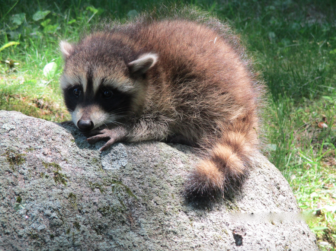
The saved baby raccoon is picture here. Photo published with permission from its owner
LaSusa phoned the Animal Control section of the New Canaan Police Department and Officer Allyson Halm rushed over, determining quickly that the wildlife had been orphaned.
It is possible that the mother raccoon had been taken out with the garbage—an unfortunate and common occurrence, according to Halm. Two of the young raccoons ran off before Halm could rescue them, leaving just one to be saved and brought to a nonprofit organization in Weston that’s dedicated to wildlife preservation and land conservation.
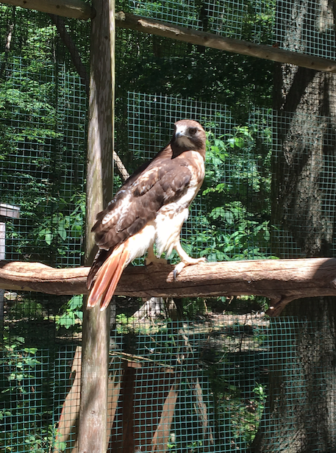
A red-tailed hawk at Wildlife In Crisis in Weston. Credit: Sarah Maddox
The incident, which captures much of what Animal Control officers do in New Canaan, also is prompting Halm to put out a call for volunteers to help transport the needy animals to Wildlife in Crisis.
“It’s all I do, all day,” Halm said of New Canaan’s wildlife activity. “I screen wildlife calls from the minute I start the shift to the end of the day, every day. It’s almost to a point where I am like, ‘What’s a dog?’ I impound two dogs a month and spend the rest of the time educating, rescuing, investigating.”
_______________________________________________
The NewCanaanite.com Summer Internship Program is sponsored by Baskin-Robbins.
_______________________________________________
According to Halm, 99 percent of the work that she does involves wildlife, and as a result she’s made it a point to facilitate the rescue of injured and orphaned wildlife when feasible.
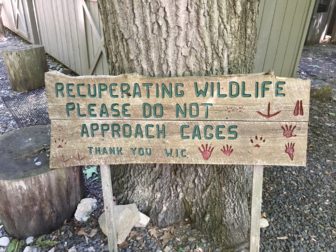
At Wildlife In Crisis in Weston. Credit: Sarah Maddox
“I answer the phone ‘Animal Control’ and I do not want to say, ‘We don’t do that’ or ‘We don’t handle that,’ ” Halm said. “I do have to refer some things but there is no exclusivity, in my opinion, in what animals we are to assist, and the calls are daily. People want their questions answered and they’re mostly about wildlife.”
However, the wildlife calls never come at a convenient time, according to Halm. The nearest crisis rescue center is in Weston, and the long drive makes it challenging for Halm to save animals all on her own.
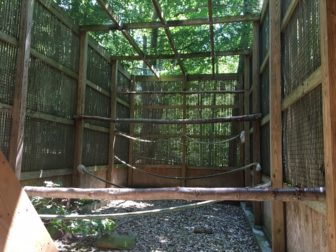
At Wildlife In Crisis in Weston. Credit: Sarah Maddox
“It’s very difficult for me to leave my post to drive all the way up there,” she said.
Halm said she would like to start a volunteer program to help address the challenge. She is looking for “interested parties that have free time during the day or can respond very quickly to driving up the animals.”
“Many people want to help, and it would be a great service for me and for wild animals. I just don’t have the freedom to drive up there,” she said. Birthing season for wild animals usually begins around April and ends in August, which is the busiest time of year for bringing animals in need to Wildlife in Crisis—an organization that also very much needs volunteers and support.
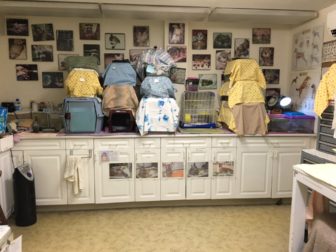
At Wildlife In Crisis in Weston. Credit: Sarah Maddox
Peter Reid of Wildlife in Crisis took in the orphaned raccoon last week at the organization’s center, a peaceful and loving place where animals are attentively cared for. The young mammal became the 55th raccoon currently housed at Wildlife In Crisis, and other animals there include ravens, owls, hawks, and fawns.
“He is already in with a couple of the raccoons, so we create a proxy family for him,” Reid said. “In this situation, so often the parent is trapped or killed in the road. All these orphaned raccoons are the result of human action, and it’s about a six month process. Initially they are being hand-fed because they still would have been nursing. In this case, he’s a very healthy specimen. He had been with the mother probably within the previous 48 hours at least. He has good body fat.”
The raccoon is currently in a cage with three or four others. The next step is for him to socialize in a bigger group of about 12 to 20 young raccoons.
In September, Wildlife in Crisis begins to release raccoons in a sponsored location.
“We find a volunteer who likes raccoons,” Reid said. “They’re generally in a cycle of being trapped or relocated or killed, because the level of tolerance for raccoons varies from person to person. They are super intelligent animals, adaptable and pragmatic about living side by side with humans. But some people are alarmed. They are probably the most persecuted mammal in Connecticut.”
Trappers take raccoons every day and often leave babies behind, according to Reid. “There is a misconception that the babies at six week are self-sufficient, so we find these clusters of raccoons huddling together on sidewalks and roads,” he said.
LaSusa said she was deeply impressed by both Halm and Reid.
Of Halm she said: “It was really amazing to see how capable and how quickly she responded.”
And of Reid: “I can’t speak more highly of Wildlife in Crisis. I can’t believe what we have at our fingertips.”
To contact Officer Allyson Halm regarding the need for volunteers to transport injured or orphaned wildlife that’s been rescued up to Wildlife In Crisis, email her at allyson.halm@newcanaanct.gov or phone 203-594-3510. Wildlife In Crisis can be reached at wildlifeincrisis@snet.net and donations can be made here.
